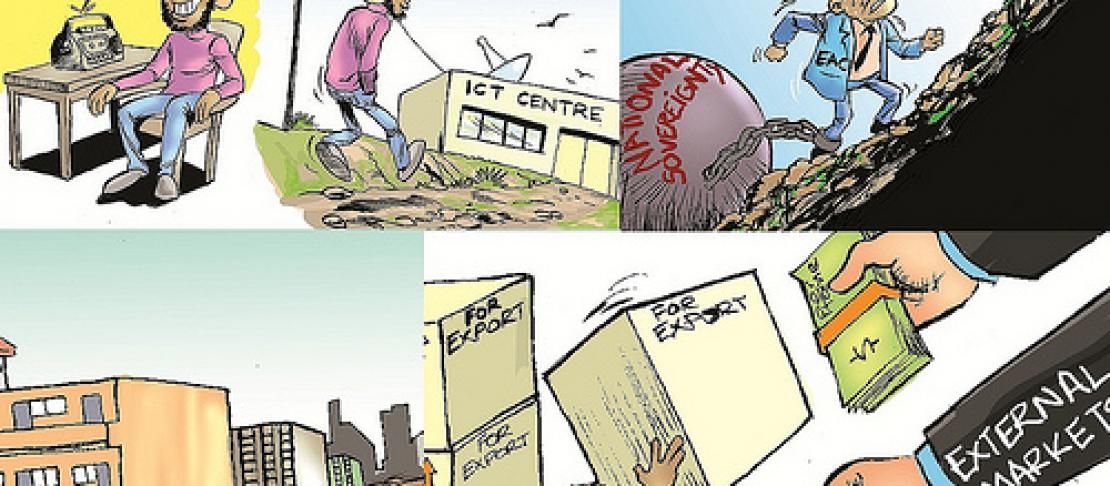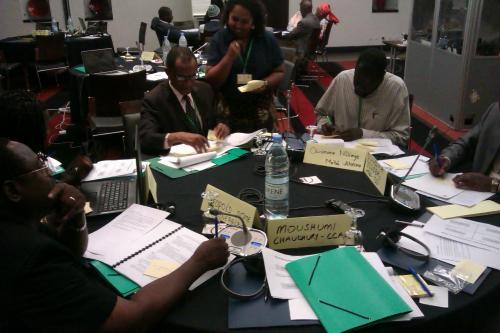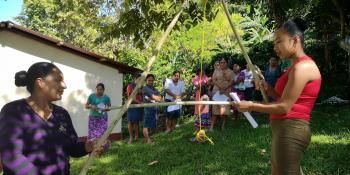CCAFS scenarios engage regions to plan for uncertain futures

The need for strategic, concerted action for improved food security, environments and livelihoods in the developing world is a major challenge. We live in a time when changing conditions and risks associated with climate change interact with rapid political, economic and social changes in the world's vulnerable regions.
Attempts to predict future changes in such complex, rapidly changing conditions are extremely difficult if not impossible. Illusions of predictability are potentially dangerous. Still, governments and non-state actors alike must think and act strategically in the face of uncertainty.
Developing Scenarios
The use and development of multi-stakeholder scenarios provides a powerful way to bring key actors together to explore future uncertainty. Scenarios help rethinking and reorganising current structures to create more robust policies and strategies. Scenarios are different “what-if” accounts of the future, told in words, numbers, images, maps and/or interactive learning tools. Scenarios are not meant to be predictive, but instead to help partners acknowledge future uncertainty and explore the dynamics of widely different but plausible future worlds.
In the CGIAR Research Program on Climate Change, Agriculture and Food Security (CCAFS) an extensive scenarios process is organized with key regional policy makers, private sector actors, NGOs, civil society organizations, media and researchers in the three current CCAFS regions – West Africa, East Africa and South Asia. The process is led by CCAFS teams and partners at the University of Oxford's Environmental Change Institute and several CGIAR centres (ILRI, ICRAF, IFPRI and ICRISAT) and the International Institute for Applied Systems Analysis (IIASA). Read more about the Scenarios work.
The goal of the first phase of this process – developing the scenarios- is to capture interactions of key socio-economic uncertainties with climate change effects at the regional level. These uncertainties form the basis for plausible alternate futures that are explored through qualitative means (storylines, system maps) and then quantified in a global context. We collaborate with the teams behind IFPRI’s IMPACT model - designed to examine alternative futures for global food supply, demand, trade, prices, and food security – and IIASA’s Globiom, designed to provide policy advice on global issues concerning land use competition between the major land-based production sectors. To listen to an interview by John Ingram, the Scenarios Leader, on the process of developing scenarios go here.
In East Africa, our pilot region, scenarios development and modelling process is nearing completion. Key regional perspectives were brought together to create four vivid and relevant scenarios. Partners identified regional integration and reactive/proactive policies as key uncertainties that provide the framework for four different scenarios: Ants in the East, Herd of Zebra, Lone Leopards and Sleeping Lions. The workshops focused specifically on mapping key trade-offs and feedbacks in each scenario. The scenarios will soon be posted online. Read more about the progress thus far in East Africa (PDF).
In West Africa, in a workshop in Dakar, Senegal on 2-4 November, A highlight of the workshop according to all who attended was a session that focused specifically on introducing different types of surprises to the scenarios – this session really pushed the boundaries and helped participants create plausible but surprising and challenging futures. A draft interim report is available in English (PDF - 2.7 MB) and French (PDF - 1.7 MB).

Using scenarios in policy development
While the process of developing scenarios is excellent for stakeholders to explore future uncertainties, share perspectives and generate new networks, the scenarios are ultimately to be used by key regional actors for strategic visioning and planning which translates into real collaborative action.
To do this, CCAFS is organizing a series of workshops in 2012 where stakeholders come together to develop a shared goal or vision for their region focusing on improved food security, environments and livelihoods - and then work back from this desired future through the different scenarios. Each scenario represents a different future world in which these stakeholders aim for their goals, with its own specific challenges, limitations and opportunities. The different scenarios help stakeholders explore what strategies and policies are needed to deal with future challenges in terms of socio-economic and political change interacting with climate change. Read more about the link between scenarios and strategic visioning in this paper.
This process will result in strategies and policy options that are robust under different plausible futures. These will then quantified and translated into action plans by the regional stakeholders. Together the CCAFS team and the stakeholders will monitor the implementation of these action plans to evaluate impacts of the process.
The CCAFS scenarios team will also engage with Panos Eastern Africa and Panos West Africa, a regional, information and communication for development non-governmental organisation. Panos will work with CCAFS to produce various media products in relation to scenarios and disseminate them through various channels, such as newspapers, radio and interactive web tools for a wider audiences.
Such a strategic visioning workshop that will use the scenarios developed in East Africa is currently being organized with regional policy makers in the East African Community secretariat in collaboration with USAID. Similar workshops for West Africa will also be organized later in 2012.
Using scenarios in research
Another important function of the scenarios is to feed into further research where the scenarios are used as providing plausible alternate contextual futures, both within and outside CCAFS. Key examples for this use of the scenarios for research are in household modelling for climate change adaptation and research on vector-borne diseases taking place the at ILRI and as a context for local climate change adaptation scenarios. Inputs from the CCAFS regional scenarios into the socio-economic development pathways for the IPCC are being explored.
Through its application across system levels and sectors, the CCAFS scenarios process plays a unique integrative role, ultimately acting as an adaptable service that helps a wide range of stakeholders challenge preconceptions based on the past and act wisely in the face of an uncertain future.
CCAFS Scenarios reports
Workshop report: Regional Scenarios for Food Security, Environments and Livelihoods in West Africa, November 2011
English (PDF - 2.7 MB) francais (PDF - 1.7 MB)
Report on Linking Knowledge with Action through Regional Scenario Building 25 November 2011
Links to further reading on scenarios and strategic visioning:
Kasper Kok, Mathijs van Vliet, Ilona Bärlund, Anna Dubel, Jan Sendzimir (2011). Combining participative backcasting and exploratory scenario development: Experiences from the SCENES project. Technological Forecasting and Social Change, Volume 78.
Ph.W.F. van Notten, A.M. Sleegers, M.B.A. van Asselt (2005). The future shocks: On discontinuity and scenario development. Technological Forecasting and Social Change, Volume 72, Issue 2.
Wilkinson, A., Eidinow, E. (2008). Evolving practices in environmental scenarios: A new scenario typology. Environmental Research Letters, Volume 3, Issue 4.
Written by Joost Vervoort, Science Officer for the Scenarios activity. Joost is based at the Environmental Change Institute, Oxford University



